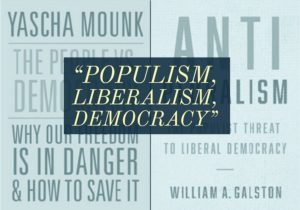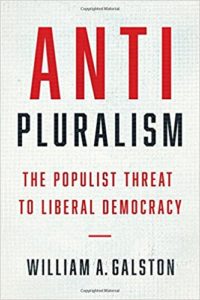 The events of the past quarter-century have challenged the view that history moves inexorably in one direction. Liberal democracy is not the “end of history”—nothing is, argues William Galston, senior fellow in governance studies at the Brookings Institution and the author of “Anti-Pluralism: The Populist Threat to Liberal Democracy.”
The events of the past quarter-century have challenged the view that history moves inexorably in one direction. Liberal democracy is not the “end of history”—nothing is, argues William Galston, senior fellow in governance studies at the Brookings Institution and the author of “Anti-Pluralism: The Populist Threat to Liberal Democracy.”
The enduring incompleteness of life in liberal societies, which ask citizens to embrace an abstract concept of equal citizenship and humanity, will always be a vulnerability, he writes for the Wall Street Journal:
The tribalism at the heart of the populist vision draws strength by appealing to those who crave more unity and solidarity than liberalism offers. For now, democratic publics want policy changes that give them hope for a better future. Left unmet, their demands could evolve into pressure for regime change. It is up to the partisans of liberal  democracy to do all we can to prevent that from happening. Historical inevitability will not determine liberal democracy’s fate. Our political choices will.
democracy to do all we can to prevent that from happening. Historical inevitability will not determine liberal democracy’s fate. Our political choices will.
The authoritarian resurgence has prompted anxiety about the fragility of democratic institutions, including renewed academic interest, reflected in such courses as Democratic Erosion, Democratic Decay or Democratic Backsliding, the Washington Post’s Sasha Ingber reports:
Democratic Erosion provides a sort of postmortem of democracy in nations where it died — and sometimes was revived. Students learn about the fate of democracies in Venezuela, Poland, Hungary and Russia, and read scholarly work such as Cas Mudde’s book “Populist Radical Right Parties in Europe” and Kurt Weyland’s [Journal of Democracy] article “Latin America’s Authoritarian Drift: The Threat From the Populist Left.” Each class has a theme, such as “Populism and Demagoguery,” “Scapegoating, Paranoia and Exclusion,” and “Resistance.” RTWT
 A new Democracy Fund Voter Study Group report, “Follow the Leader: Exploring American Support for Democracy and Authoritarianism” (which I wrote with Larry Diamond and Joe Goldman), sheds some discouraging light on the dark moment we may be in, Lee Drotman writes for Vox:
A new Democracy Fund Voter Study Group report, “Follow the Leader: Exploring American Support for Democracy and Authoritarianism” (which I wrote with Larry Diamond and Joe Goldman), sheds some discouraging light on the dark moment we may be in, Lee Drotman writes for Vox:
In the past decade or so, political scientists have returned to the topic of authoritarianism in America, boasting new measures and methodologies to overcome the previous round of criticisms. And once again, the same basic dynamics have shown up — individuals who hold “traditional” views on culture and race tend to also hold “authoritarian” views about strict parental discipline and hierarchy (these parenting attitudes that now stand in for broader authoritarian leanings). And under conditions of high threat, these authoritarian attitudes take on a more central role in our political thinking.







